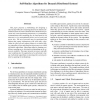Free Online Productivity Tools
i2Speak
i2Symbol
i2OCR
iTex2Img
iWeb2Print
iWeb2Shot
i2Type
iPdf2Split
iPdf2Merge
i2Bopomofo
i2Arabic
i2Style
i2Image
i2PDF
iLatex2Rtf
Sci2ools
104
click to vote
ICDCS
2007
IEEE
2007
IEEE
Self-Similar Algorithms for Dynamic Distributed Systems
This paper proposes a methodology for designing a class of algorithms for computing functions in dynamic distributed systems in which communication channels and processes may cease functioning temporarily or permanently. Communication and computing may be interrupted by an adversary or by environmental factors such as noise and power loss. The set of processes may be partitioned into subsets that cannot communicate with each other; algorithms in which all such subsets behave in a similar fashion, regardless of size and identities of processes, are called self-similar algorithms. Algorithms adapt to changing conditions, speeding up or slowing down depending on the resources available. The paper presents necessary and sufficient conditions for the application of a self-similar strategy. Self-similar algorithms are developed for several problems by applying the methodology.
Communication Channels | Distributed And Parallel Computing | Dynamic Distributed Systems | ICDCS 2007 | Self-similar Algorithms |
Related Content
| Added | 03 Jun 2010 |
| Updated | 03 Jun 2010 |
| Type | Conference |
| Year | 2007 |
| Where | ICDCS |
| Authors | K. Mani Chandy, Michel Charpentier |
Comments (0)

